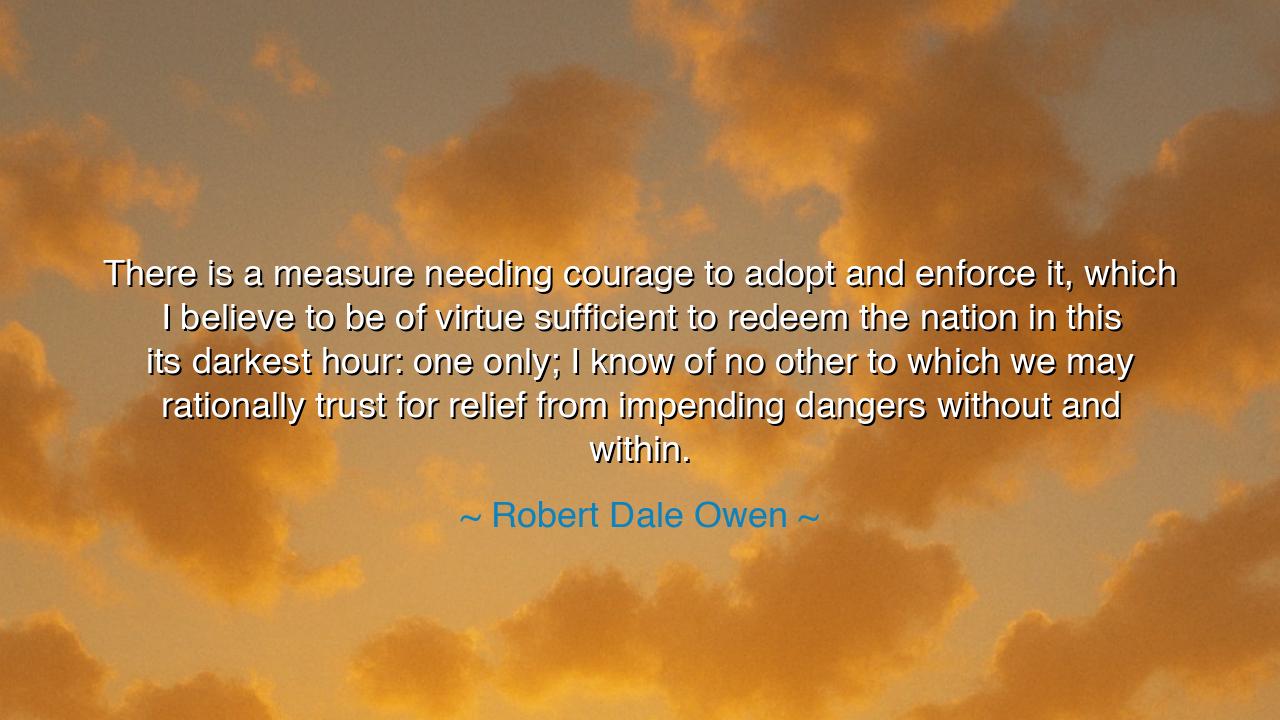
There is a measure needing courage to adopt and enforce it, which
There is a measure needing courage to adopt and enforce it, which I believe to be of virtue sufficient to redeem the nation in this its darkest hour: one only; I know of no other to which we may rationally trust for relief from impending dangers without and within.






“There is a measure needing courage to adopt and enforce it, which I believe to be of virtue sufficient to redeem the nation in this its darkest hour: one only; I know of no other to which we may rationally trust for relief from impending dangers without and within.” Thus spoke Robert Dale Owen, a man of conscience and conviction, in the shadowed days of the American Civil War. His words, though born of that era, ring through time as a call to all generations: that in moments of despair, when nations tremble and hearts grow faint, salvation lies not in comfort or compromise, but in courage — the courage to do what is right, though it cost everything.
Owen, a reformer and statesman, uttered these words in 1862, when the Union itself seemed on the brink of destruction. Brother was set against brother, and the land groaned under the weight of its own contradictions — proclaiming liberty, yet bound in chains of slavery. In that hour of turmoil, Owen saw a single path forward: the abolition of slavery, an act that demanded not mere political calculation but moral courage — courage to confront the sins of a nation, courage to challenge old powers, courage to suffer for righteousness’ sake. This, he said, was the one measure “of virtue sufficient to redeem the nation.” All others were but half-measures, fleeting remedies for a mortal wound.
Such words were not spoken from ease, but from fire. To adopt and enforce the measure he spoke of meant facing opposition from both within and without. The enslaved cried for freedom; the enslavers, for profit. The North was divided; the South defiant. To call for abolition in such a time was to invite wrath. Yet Owen, like the prophets of old, stood unyielding. He saw that a nation without virtue is a body without soul, and that no peace built on injustice can endure. The courage he demanded was not of sword or gun, but of spirit — the courage to confront moral evil, to purify the heart of a people, to act when silence becomes betrayal.
History bears witness to the truth of his vision. When Abraham Lincoln, himself a man of quiet strength, issued the Emancipation Proclamation, he did so not from certainty of success, but from faith in what was right. Many told him it would divide the Union further, that it would bring ruin, that it was folly. Yet he pressed forward. That act — courageous, perilous, righteous — became the turning point of the war. The measure of virtue that Owen foresaw had been taken, and though the cost was great, it redeemed the soul of the nation. For when justice is chosen over fear, even the darkest hour becomes dawn.
But let us not believe that these words belong only to the past. Every generation faces its own “darkest hour,” its own “impending dangers without and within.” The temptations of greed, the divisions of hatred, the apathy of comfort — these are foes as formidable as any battlefield. And still, the remedy remains the same: courage born of virtue. It is not enough to know what is right; one must act upon it, though the world stands against them. For courage is not found in the absence of fear, but in the conquest of it.
Think of the countless souls who, in quiet corners of history, have answered this same call — the reformer who defies oppression, the journalist who tells forbidden truth, the teacher who speaks light into ignorance, the citizen who stands alone for justice. Each embodies Owen’s eternal measure: the belief that virtue, when joined with courage, can redeem not only a nation, but the heart of humanity itself. Their actions may seem small in the eyes of the world, yet in the scale of eternity, they outweigh empires.
Therefore, my children, learn from this teaching: when darkness surrounds you, do not look for easy answers or swift escapes. Seek instead the measure of virtue within your own soul. Ask not what will please the many, but what will serve the right. Have the courage to adopt and enforce that truth, first in your heart, then in your deeds. Whether the world praises or condemns you matters not — for righteousness is its own reward, and justice its own vindication.
Let these words be your compass: “There is a measure needing courage to adopt and enforce it.” Find that measure in your own time — the cause that demands your voice, the wrong that demands your resistance, the truth that demands your stand. For if each person, in their own sphere, acts with courage and virtue, no nation, however fallen, can remain unredeemed. And when future generations look back upon you, they will say, as we now say of Robert Dale Owen: “In the darkest hour, he dared to believe in the light.”






AAdministratorAdministrator
Welcome, honored guests. Please leave a comment, we will respond soon